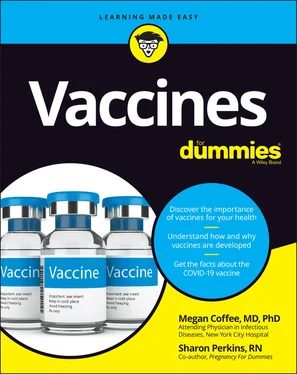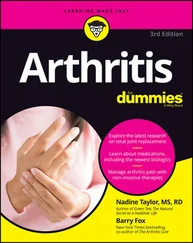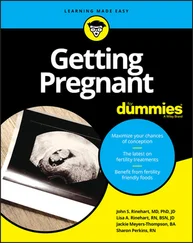Wet stage: The disease then progresses to the wet stage (with more fevers and now diarrhea and vomiting and sometimes bleeding and miscarriage in pregnant women). It is in the wet stage that people are very sick and often become confused. They need the help of others to take care of them, and they are also the most infectious then. Ebola can spread from the diarrhea, sweat, and other body fluids, making others sick. The virus often infects family members who care for those who are sick, nurses and doctors, and those involved in preparing for funerals as bodies after death remain infectious.
Some people have very mild cases, and others have very serious cases. The initial amount of virus someone has in their blood when tested can predict their chance of getting better. People who get better from Ebola can go back to their regular lives and aren’t infectious once they clear the virus. However, the virus can hide where the immune system doesn’t notice the virus as quickly. For example, the virus can remain in men’s testes and result in spreading the virus through sex, even a year later. Some people also can have eye symptoms and vision loss later on because the virus can remain in the eye and cause inflammation.
Most outbreaks have been fewer than 100 cases. It wasn’t until Ebola was identified in West Africa in 2014, as it spread largely between Liberia, Sierra Leone, and Guinea, that we ever saw a large epidemic over a few hundred. This outbreak spread unnoticed at first but then rapidly caused over 28,000 cases and over 11,000 deaths. A large international commitment of people working in collaboration was required to control it, as the virus often spreads among clinics and hospitals, affecting those most needed to fight it and making it even harder to contain.
Ebola is called a viral hemorrhagic fever (VHF). That means it is a virus that causes a fever, which can be accompanied by bleeding, often with a severe infection affecting multiple organs. There’s often a lot of fear around the bleeding, but in reality bleeding is not that common and usually not the worrisome part of the disease. Instead, it’s that the virus can affect multiple organs, making it difficult for them to function together.
We’re on the lookout for other related and unrelated viruses that also cause VHFs. These include Lassa (a close relative to Ebola), yellow fever, dengue (rarely causes a VHF), Crimean-Congo hemorrhagic fever, Rift Valley fever, and about ten others. We never want to have a case of a viral hemorrhagic fever, but although these viruses can seem scary, if the correct actions are taken to stop transmission and control the outbreak, they can be stopped.
Surveying Variola (Smallpox)
Smallpox is the only human virus that humans have ever eradicated. There were two different variants. The more dangerous version would kill 30 percent of those infected and leave survivors with scars, frequently on their faces.
This virus led to the first inoculations with bits of material from smallpox skin lesions. These date back to at least the tenth century BC in China. The virus was so bad that it seemed better to be injected with a small amount and have a mild infection with some risk than to have a severe infection later with greater risk of dying. It also inspired the first vaccine, using cowpox to create a mild infection that protected against smallpox in 1796. (See Chapter 5for more on the development of the smallpox vaccine.)
The World Health Organization, a little under 200 years later, building on the success of the vaccine, led a large campaign to vaccinate and track down every last case until they finally succeeded in 1977. In the last 100 years before it was eradicated, variola is thought to have killed 500 million people. There was one last death from smallpox after it had been eradicated, a visitor to a laboratory where it was still studied. After this occurred, stocks of smallpox virus were destroyed around the world. Only the United States and Russia are known to have kept stocks in laboratories.
The upper arms of those who were vaccinated for smallpox have a small scar that shows they were vaccinated. Vaccination was stopped in 1972 in the United States, after the disease was eliminated from the United States. By 1980, vaccination had stopped worldwide. It just wasn’t needed anymore, but some people, those who work in labs with the virus or military personnel, may still be vaccinated because there is concern about bioterrorism from this virus.
Конец ознакомительного фрагмента.
Текст предоставлен ООО «ЛитРес».
Прочитайте эту книгу целиком, купив полную легальную версию на ЛитРес.
Безопасно оплатить книгу можно банковской картой Visa, MasterCard, Maestro, со счета мобильного телефона, с платежного терминала, в салоне МТС или Связной, через PayPal, WebMoney, Яндекс.Деньги, QIWI Кошелек, бонусными картами или другим удобным Вам способом.












